
When Germany’s Christian Democrats and Social Democrats — who frequently split up to 90 percent of the votes between them during the Cold War era — fell to a combined 50 percent support in the federal election in September, alarm bells went off across the Atlantic.
The New York Times saw “messier politics” and “weaker leadership” ahead. The Washington Post feared a period of “limbo” as a result of Germany’s “Dutchification”. Harold James, a professor at Princeton University, lamented that Germany had acquired “the most destructive features of politics in neighboring countries.” The consequences, he argued, would be “complexity,” “endless negotiations” and “inevitably complicated coalition agreements.” Damon Linker, a columnist for The Week, predicted forming a “stable” government would be “challenging” and “decisive action” more difficult.
Some people never learn. We saw the same reaction after the European elections in 2019, and again when Stefan Löfven lost his parliamentary majority in Sweden this summer. Yet Christian Democrats, Social Democrats and liberals were able to quickly form a working majority in the European Parliament and Löfven remains prime minister.
Germany’s liberals and Greens — who can help either the Christian Democrats or Social Democrats to a majority — have already done a deal between them, clearing the biggest hurdle to a three-party coalition. Negotiations are now underway. Olaf Scholz, the Social Democratic Party leader, could become chancellor in a few weeks. So much for the “limbo” we were told to expect.
What’s the problem?
Alarmists warn of “complexity” and “mess”, but seldom explain how political fragmentation might inhibit policymaking or diminish trust in institutions.
It’s not like two-party politics is always simple and clean. Democrats in the United States control the presidency, the House of Representatives and the Senate, and still the process of getting an infrastructure bill — which even some Republicans support — through Congress has involved, dare I say, “endless negotiations” and “complicated agreements.”
The need for investment in American infrastructure is often overstated. The World Economic Forum ranks it thirteenth in the world. But that’s behind multiparty democracies, like the Netherlands and Switzerland.
Multiparty democracies top more rankings. Denmark, Iceland, Israel and the Netherlands have the best pension systems. The Netherlands and Norway have the best health care. Iceland, Luxembourg, Norway and Sweden have the best child care. The Scandinavians and Dutch are the happiest people in the world.
The rule of law is stronger in multiparty systems. Of the ten politically most stable countries, only two aren’t governed by coalitions: Australia and Canada. (Australia’s Liberals and Nationals technically are a coalition, but they never govern separately nor with anyone else.)
Political fragmentation doesn’t appear to be a drag on economic growth. The economically freest, most competitive and richest countries in the world include two-, three- and multiparty democracies. There is no obvious correlation.
If this is decisive…
If Germany is entering a period of indecisiveness and “weak” leadership as a result of its fragmentation, was the outgoing two-party government decisive and strong?
Not really. As I wrote here before the election, Angela Merkel’s “grand coalition” of Christian Democrats and Social Democrats left major issues unresolved:
- Competitiveness: Germany fell from third to seventh place in the World Economic Forum’s index. Merkel tried to convince states to harmonize regulations — a major impediment to business growth — but failed, even though her own party sits in eleven of Germany’s sixteen state governments.
- Defense: The German military has been underfunded to the point that it is barely combat-ready.
- Digitalization: Germany’s 4G mobile network is one of the worst in Europe. Health authorities still use fax. Half of German schools don’t have Wi-Fi.
- Energy: Phasing out nuclear power increased Germany’s reliance on dirtier coal and imported Russian gas, slowing its transition to clean energy and making it harder for Europe to stand up to Vladimir Putin.
- Mobility: Germany has fewer charging points for electric cars than the Netherlands, which has one-fifth the population. Just one in five travelers between Berlin and Munich take the train. Germany’s high-speed rail network ranks below France and Spain.
I can think of two reasons:
- Complacency. Merkel’s Christian Democrats expected to win anyway, so why take a chance with bold policies?
- Lack of consensus, especially about Germany’s role in the world and whether, and how fast, to transition away from fossil fuels.
Consensus doesn’t arise from fierce competition between two political parties; it is the outcome of “endless negotiations” and “complicated coalition agreements.”
What’s the alternative?
“Dutchification” has its shortcomings. It’s been seven months since we had elections in the Netherlands and parties still haven’t formed a government.
Coalition politics do tend to produce “weak” leaders, but who wants “strong” leaders if they look like Boris Johnson, Narendra Modi or Donald Trump? I’ve said this before: strong societies don’t need strongmen.
Two-party systems have their own drawbacks. They force voters to pick one of two sides, reduce complex political questions to either-or solutions and make it possible for extremists to take power by hijacking a major political party.
In Germany, the far right went down from 13 to 10 percent support in September. In America, it took over the Republican Party.
Multiparty systems force politicians to meet in the middle. They’re less “decisive”, but they’re more stable: policy won’t lurch from left to right.
The United States was taken into the Paris Climate Agreement by Barack Obama, taken out by Donald Trump, and taken back in by Joe Biden. Whatever your opinion of the climate pact, surely that’s not the best way to conduct diplomacy?
Britain is similarly cavalier about its international commitments, breaking promises — on Gibraltar and Northern Ireland — it made the EU only a year ago.
Winner-takes-all democracy engenders a winner-takes-all mentality. Politicians who must govern in coalitions know better than to put hard-won compromises at risk.
